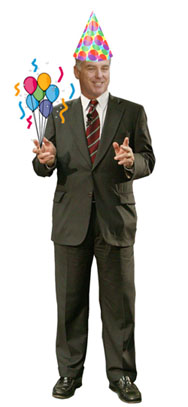On October 28, Paul Hackett was interviewed by Ed Schultz at a pre-election rally in Columbus, Ohio at the Plumbers and Pipefitters union hall. The following is a transcript of a large part of the interview. You can listen to the whole thing here.
Schultz: Why are you doing this? Why are you gonna run? You loved the last election so much you want to do it again?
Hackett: I'm a glutton for abuse. It's pretty straightforward. I came back from Iraq as you know, and that's what got me into the congressional race. And I look at this great country that we live in, and I believe to the core of my bones that currently our country is well on the way down the wrong path, and I'm looking around for other Americans to get up and serve, and put their country first, and put their country before their career. And I felt that way in serving in Iraq, and I felt that way in getting into the congressional race, and I feel that way now. I mean, I got a straighforward mission, and I want to help correct what is going wrong with our country, period.
Schultz: You gotta love that! (cheers heard in the background) You gotta love that.
...
Schultz: We're living in some very interesting times. We're living probably in one of the most selfish generations in the history of the country. And we're not all going to be millionaires--we're not, and we may never be--and there's folks out there who are working two and three jobs that just want a better chance for their kids. I mean it's about the kids, isn't it? What's our legacy? What are we gonna leave behind? (Applause)
Hackett: You sound like me on the stump, Ed.
Schultz: It's the truth. Every where I go, and everywhere Team Fargo goes, we see it in your eyes. There's fire in your eyes to change what's happening in America. Whether it's left, right, Republican, Democrat, the fact is, things aren't going as good as they should be. We can do better than this! And that's what I hear in your voice.
Hackett: Well, I mean it. Look, I mean we live in the greatest country in the world and here we are at the crossroads. And our generation--my generation--probably for the first time in the history of this great nation is at a point where we may leave to our kids and our grandkids an America that is not as what we received, and I don't want to see that happen.
Schultz: Well, the reason I brought up finances is because I think that people would like to do more. I think there's a lot of middle income people, and the way that politics and elections go in this country, it seems like money rules. But I maintain the fact that there's no price tag on volunteerism. And that you can get involved and you can make a difference and you can act and get after it. And that's what you're doing. You're taking the lead. Your military experience is going to help the party immensely, I think, because you can speak with credibility and experience. And I want to know, if you were in the United States Senate, and if you knew back then, what you know right now--
Hackett: Hey, I think you've already asked me that question before, Ed. At least, I've been asked that question a number of times. And I've said it, I would not have voted to go into Iraq, and unfortunately, nobody was really interested in what my politics were three years ago as we were leading up to Iraq, so I always encourage everybody who has any doubt to ask my poor wife, and ask the folks who work for me in my law practice, because they had to listen to me every day on the rant about how stupid this was. And it didn't take a lot of genius to figure out that invading Iraq was a bad idea. Because, if you listen to General Shinseki, if you listen to General Zinni, those two guys are four star generals, one in the Army, one in the Marine Corps, and they were cautioning this administration not to go into Iraq. And what did this administration do? They ignored thirty year career generals and their advice. That's what those guys do for a living--those guys are the professionals. Those are who the administration, this civilian administration, should consult when they're thinking about doing that. And what happened to them? Well, General Shinseki was retired, and General Zinni who was a Mideast envoy was, shall we say, let go.
Schultz: Paul Hackett, with us on the Ed Shultz Show. You're an attorney, I forgot about that. Hell, you could be on the Supreme Court before this is over with. (Nah, not under Bush. He's probably overqualified.)
(break)
Schultz: You were in Iraq when?
Hackett: I was in Iraq from mid-August '04 to March of this year. As a matter of fact, a year ago today (October 28) I just took over my little forward operating base outside of Fallujah.
Schultz: In your opinion, has it gotten better?
Hackett: No, not at all.
Schultz: Not at all...even with the constitutional vote?
Hackett: Yeah, I mean, hey, that's a success. But my question is, is that what the American people signed up to spend their tax dollars for, and is that what we wanted to spend 2000 lives for on the theory that we're going to spread democracy on the business end of an M16? I don't think so--I didn't. (Applause). So, if you look at what's gone on in Iraq for the past 2 1/2 years, and you look at it nonemotionally and objectively and try to ferret out the successes, the security situation today is not as good as it was six months ago, a year ago, two years ago. And the infrastructure is not as good as it was six months ago, a year ago, or two years ago, and the reason we aren't having success in fixing the infrastructure is because the security situation is so bad. And the security situation is so bad because this administration ignored the generals and their advice on what it would take to secure that country after we toppled Saddam Hussein, so we're back to where we got started.
Schultz: These guys were telling Wendy and I the other night at dinner that the intensity, the sophistication, and the organization of thes insurgents, these road side bombs that are going off, it is phenomenal how sophisticated they've gotten.
Hackett: These guys are not rookies.
Schultz: We've trained them. This event has trained them and given them a lot of knowledge, and they're only getting better at it.
Hackett: To diminish the smarts, skill, and tenacity of the insurgents that we're fighting over there is to not face reality. These folks--and they're bad SOBs--but they're good fighters and they're smart, and it doesn't do anybody any service to sort of downplay them and say silly things like "They're in their death throes" and their about defeated, it's silly. I suppose they appear to be in their death throes from the White House, but I'm not drinkin' that Kool-Aid. I was there. (Applause)
Schultz: Okay, Paul, you're on the Senate floor--what would you advocate America should do right now in Iraq?
Hackett: Here's what the president of the United States has to do. He has to face the fact that--and I'll say it this way, we as a nation made a mistake in going into Iraq, and he's got to face the fact that he's got to withdraw from Iraq, and the way he accomplishes that is to rely on the military expertise and task the generals to extricate us from Iraq...
Schultz: Starting now?
Hackett: Yeah. This is not something that's going to happen overnight, but the planning has to start now and the retrograde has to start now. Because make no mistake, whether we leave a year from now, five years from now or ten years from now, that place ain't gettin' better, and whenever we leave, that place is going to spiral out of control before it improves on its own. What has been accomplished over there to this date is as good as it's gonna get. And it's time to turn it over to the Iraqis. They want their freedom, they want their independence, it's time for them to pick up the ball and run with it and take care of themselves.
Schultz: Do you agree with that, folks? (Applause)
Hackett: Well, pouring billions of dollars of American tax dollars onto that situation, and spending more American lives ain't gonna make it better.
Schultz: Conservatives are saying that you're advocating a "cut and run" policy. They're going to say, "No we can't begin to draw down troops now, you're saying that we should draw down troops now. What about their argument saying that would only embolden the terrorists, that would only create a safe haven for them?
Hackett: They're already emboldened. I know that first hand. I don't have to go to a Powerpoint presentation at the Pentagon to know that, and the "cut and run" argument, first of all, what is the strategy? I call on the President of the United States to explain to the American people, taxpayers, those who are fighting the war over there, what the hell is the strategy? What's the goal? "Cut and run"--you know, part of that argument is, "Well, it's better to fight them over there than on our shore."
Schultz: No, no, that's not acceptable vernacular on the Ed Schultz Show from this moment on!
Hackett: Right, well, here's the answer to that, we had the righteous fight in Afganistan. You know how many troops we've got in Afganistan to fight that righteous fight? Twenty thousand--twenty thousand! That's where the fight was.
Schultz: I agree with that. And they didn't even tell us they were stripped of resources to get ready for Iraq. All right, so, if you get into the Senate, you would be an advocate for the military. I mean, don't you think that Americans need to hear that from liberals and from the Democratic party?
Hackett: How could I not be an advocate for the military? I'm part of the military, I'm one of them. And I see the "Support the Troops", guess what, brother, I am one of the troops!
Schultz: Do you think that Democrats have an image problem with the military?
Hackett: Well, they have a bit of an image problem. They need to get schooled up on how to speak to the military, because so frequently the language that they use doesn't really cut in to the military. You know, when you call Marines soldiers, when you call sailors soldiers, you know, with the young bucks out there on the carriers, and on the ground over there, you're not being heard when you don't speak the language, and it diminishes your credibility. So, I say as constructive criticism to Democrats, we've got to learn to speak the language. And we've got to be willing to serve, even if we want to be critical. Because, look, at the end of the day, we're Americans first, we're Americans before we're Republicans or Democrats, and we've got to stay focused on that.
(break)
Schultz: All right, Mr. Hackett, you're not a one-issue candidate, are you? God bless you for the military. What's next on your list?
Hackett: Well, I think number one on the list is the economy and saving the middle class of America.
Schultz: You got that right. (Applaluse)
Hackett: You know it's funny that you ask me that question, because when I started my congressional race, that was the only thing that I was talking about was the economy and the middle class, that we're exporting to China and India. And then pretty soon everybody kind of caught on that I'd been to Iraq, and I suddenly was labeled the Iraq war vet who comes back and runs for congress. The two are related, obviously, when you consider the amount of money we're spending over in Iraq, and how that money could probably be better used here in the United States.
 Alternate link for comments
Alternate link for comments






















